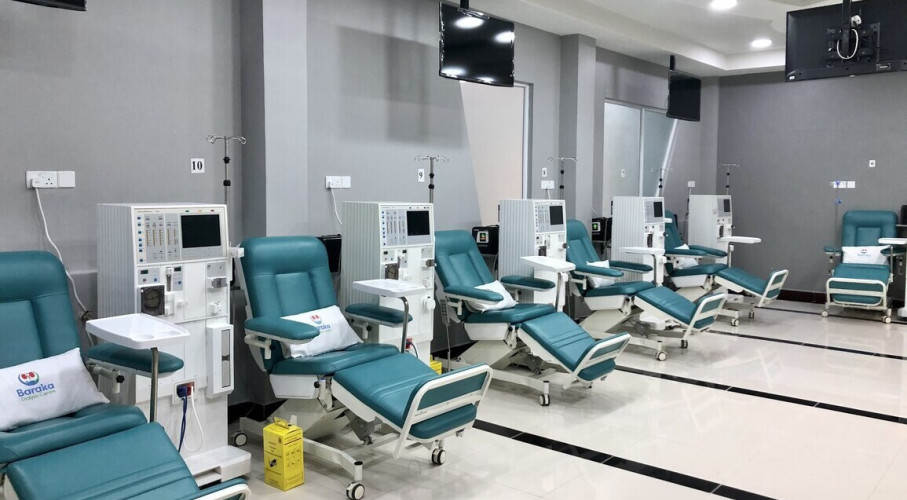Kidney Disease represents a major and growing public health challenge in Nigeria, with millions of individuals affected and an increasing number progressing to end-stage renal disease (ESRD). For many of these patients, dialysis is a vital and often life-sustaining treatment. However, access to dialysis remains severely limited across much of the country, particularly in semi-urban and rural areas. The majority of existing dialysis services are located in urban tertiary hospitals, leading to overcrowding, long wait times, and limited treatment availability. Many patients are forced to travel great distances, incur high treatment costs, and ultimately experience inconsistent care that negatively impacts their health outcomes.
The 4-Bed Dialysis Centre Project is a strategic initiative designed to bridge this access gap by establishing a purpose-built, community-focused dialysis facility equipped to deliver high-quality haemodialysis care. Located in an underserved region, the centre will be fitted with four modern dialysis machines and operate multiple shifts daily, making it capable of serving a significant number of patients each week. The centre will follow strict clinical protocols to ensure safe, effective, and affordable dialysis treatment tailored to the needs of each patient.

This project not only aims to provide essential dialysis services but also to integrate holistic kidney care and support systems. It will offer patient education on disease management, lifestyle and dietary counseling, and psychosocial support to help improve long-term patient outcomes. The centre will also work closely with local health clinics and hospitals to establish a seamless referral network for early diagnosis and follow-up care.
In addition to direct clinical services, the Dialysis Centre will play a crucial role in raising community awareness about kidney health. Through outreach programs, health talks, and screening events, the centre will promote early detection of CKD and prevention strategies aimed at reducing disease progression. This public health component is essential to tackling the root causes of CKD, such as hypertension, diabetes, and poor lifestyle habits, which are prevalent in the Nigerian population.
By decentralizing dialysis care and bringing it closer to communities that need it most, this centre will significantly reduce barriers to treatment, decrease the rate of complications from missed dialysis sessions, and improve the overall quality of life for patients living with kidney failure. Furthermore, it will provide employment opportunities for healthcare workers, contribute to local capacity building in renal care, and serve as a scalable model for replication in other underserved regions of the country.
The establishment of the 4-Bed Dialysis Centre represents a practical and impactful step toward improving kidney health outcomes in Nigeria. It addresses immediate clinical needs while also contributing to long-term systemic improvements in CKD care, prevention, and public awareness.
The centre will provide reliable, life-sustaining dialysis treatments to patients who previously had limited or no access to care. This localized access can prevent life-threatening delays in treatment and reduce patient travel burdens.
Early and consistent dialysis significantly improves quality of life and longevity for CKD patients. By offering regular treatment and monitoring, the centre will contribute to better disease management and fewer complications.
The facility will create employment opportunities for dialysis nurses, technicians, and support staff. It will also serve as a training ground for healthcare professionals in nephrology and renal care.
The dialysis centre offers a lower-cost solution than emergency hospital admissions for kidney failure. Affordable, community-based dialysis reduces long-term healthcare expenses for both patients and the health system.
Our broad objective is to establish an ultra-modern Dialysis centre that provides safe, quality, predictable, and compassionate dialysis treatment. We need to achieve the following objectives:
Establish a fully equipped 4-bed dialysis unit with modern machines and supporting infrastructure.
Deliver affordable, high-quality dialysis care to CKD patients in underserved regions.
Train and retain a team of skilled professionals, including dialysis nurses and technicians.
Implement a patient-friendly scheduling and referral system for optimal resource utilization.
Raise community awareness about kidney health and CKD prevention strategies.
Assess CKD burden and dialysis needs in target region
Site selection and infrastructure design
Regulatory compliance and permit acquisition
Partnership development with hospitals, NGOs, and suppliers
Renovation or construction of the dialysis unit
Procurement and installation of dialysis machines, water treatment system, and emergency equipment
Setup of patient reception, monitoring, and documentation systems
Hire trained dialysis nurses, technicians, and support personnel
Conduct onboarding and capacity-building workshops
Develop clinical protocols, infection control policies, and emergency procedures
Conduct community health outreach and screening campaigns
Establish partnerships with local clinics for patient referral and follow-up care
Gradual scaling of services based on demand
Explore mobile dialysis options or satellite units in neighboring areas
Continue staff development and community education initiatives
Engineering National Prosperity